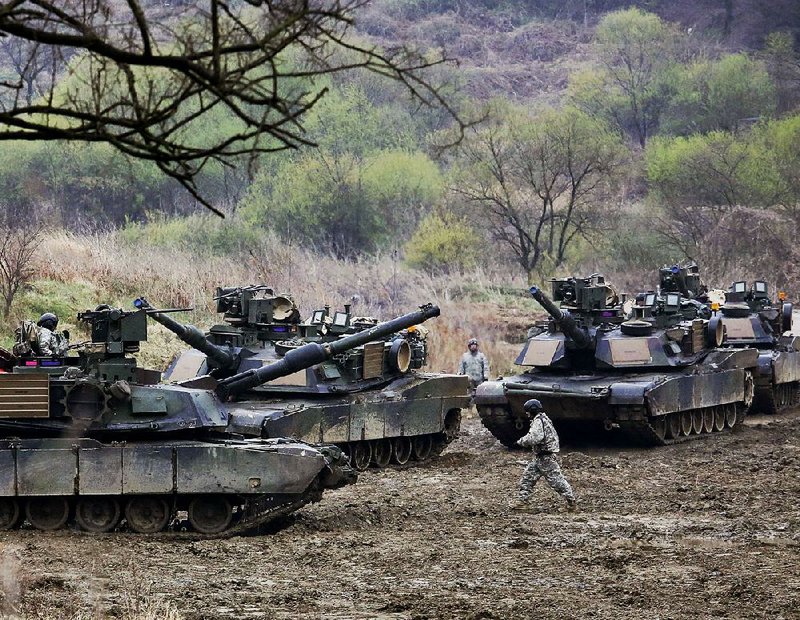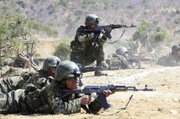TOKYO -- China issued a stern warning Friday to both the United States and North Korea, urging them not to push their recriminations to a point of no return and allow war to break out on the Korean Peninsula.
In comments carried by China's official Xinhua news agency, Foreign Minister Wang Yi said "storm clouds" were gathering, an apparent reference to North Korean preparations to conduct a new nuclear test and the United States' deployment of a naval strike force to the waters off the peninsula. In addition, the U.S. military has been conducting large-scale military exercises with South Korean forces, drills that the North considers provocative.
"The United States and South Korea and North Korea are engaging in tit for tat, with swords drawn and bows bent," Wang said after a meeting with visiting French Foreign Minister Jean-Marc Ayrault, Xinhua reported. "We urge all sides to no longer engage in mutual provocation and threats, whether through words or deeds."
He also called on them not to push matters to a point from which they "cannot be turned around."
[PRESIDENT TRUMP: Timeline, appointments, executive orders + guide to actions in first 100 days]
If they allow war to break out on the peninsula, they must bear the historical responsibility and "pay the corresponding price," Wang warned.
"Once a war really happens, the result will be nothing but losing all around, and no one could become a winner," Wang said.
Earlier Friday, North Korea accused President Donald Trump of "making trouble" with his "aggressive" tweets, over concerns that tensions between the two countries could escalate into military action.
And the North Korean army threatened to annihilate U.S. military bases in South Korea and the presidential palace in Seoul in response to what it called Trump's "maniacal military provocations."
A spokesman for North Korea's military warned Friday that "the Trump administration's serious military hysteria has reached a dangerous phase which can no longer be overlooked."
Tensions have been mounting steadily in recent weeks, as North Korea prepares for what it is calling a "big" event to mark the anniversary today of the founder's birthday, while the Trump administration warns that all options are on the table.
Neither a nuclear test nor a missile launch in the lead-up to today's celebrations in Pyongyang has come to pass. Instead, there are signs that the regime is getting ready to hold a huge parade this weekend, perhaps showing off new missiles -- something that would qualify as the "big" event it had heralded.
Pyongyang has undertaken five nuclear tests since 2006.
Pence visiting region
The United States has sent the USS Carl Vinson aircraft carrier and its battle group to the Korean Peninsula region, and Trump has tweeted that if China will not use its leverage to rein in North Korea, the United States will act.
The Chinese military, meanwhile, dispatched 20 submarines in waters around the peninsula, South Korea's Yonhap News reported Friday, citing Taiwanese media outlet CNA.
Commercial satellite imagery of North Korea's Punggye-ri nuclear test site obtained by 38 North, a program devoted to analysis of the country at the Johns Hopkins University School of Advanced International Studies, showed activity at the site suggestive of preparations for a nuclear test.
Vice President Mike Pence is to arrive Sunday in Seoul on the first leg of an Asia tour, where he will underscore Washington's strong alliances with South Korea and Japan and their determination to stop North Korea's nuclear-weapons program.
Pence will discuss the U.S. response on the 10-day tour.
U.S. officials said Friday that the president's advisers weighed a range of ideas for how to get North Korea to abandon its nuclear program, including military options and trying to overthrow the isolated communist dictatorship's leadership. At the other end of the spectrum, they looked at the notion of accepting North Korea as a nuclear state.
In the end, however, they settled on a policy that appears to represent continuity.
The administration's emphasis, the officials said, will be on increasing pressure on North Korea with the help of China, North Korea's dominant trade partner. The officials weren't authorized to speak publicly on the results of the policy review and requested anonymity.
The officials said the goal of engagement would have to be North Korea's denuclearization. It cannot lead to an arms-control agreement or reduction of the North's atomic arsenal that would imply American acceptance of North Korea as a nuclear power.
The officials are hopeful China and Russia would agree to tighter U.N. sanctions on North Korea if it conducts another nuclear test. They pointed to a recent editorial in a state-run Chinese newspaper advocating tighter restrictions on selling oil to North Korea.
Trump, who last week acted unilaterally in ordering a cruise-missile strike on Syria, has been using America's military might to send a message to Kim.
Trump repeatedly has issued ambiguous threats that if China isn't willing to do more to squeeze the North, the U.S. might take the matter into its own hands.
"North Korea is a problem," Trump told reporters Thursday at the White House. "The problem will be taken care of."
But a U.S. military official, who requested anonymity to discuss planning, said the U.S. doesn't intend to use military force against North Korea in response to either a nuclear test or a missile launch. The official said plans could change in the unlikely event a North Korean missile targets South Korea, Japan or U.S. territory.
'vicious, aggressive'
North Korea's vice foreign minister, however, said Trump was "becoming more vicious and more aggressive" than previous presidents, which was only making matters worse.
"Trump is always making provocations with his aggressive words," Han Song Ryol said in an interview in Pyongyang. "So that's why. It's not the DPRK but the U.S. and Trump that makes trouble," he said, using the abbreviation for the Democratic People's Republic of Korea, as North Korea is officially known.
Han also repeated the regime's common refrain that North Korea is ready to act to defend itself.
"We've got a powerful nuclear deterrent already in our hands, and we certainly will not keep our arms crossed in the face of a U.S. pre-emptive strike," Han said.
As for when the next nuclear test would take place, "that is something that our headquarters decides," he said.
His message chimed with a statement Friday from North Korea's Institute for Disarmament and Peace that it was the United States pushing the Korean Peninsula, "the world's biggest hotspot," to the brink of war by bringing back a naval strike group.
"This has created a dangerous situation in which a thermonuclear war may break out any moment on the peninsula and pose a serious threat to the world's peace and security," the statement said.
North Korea has a habit of fueling tensions to increase the rewards it might extract from the outside world if it desists. Previously, North Korea has agreed to return to denuclearization talks in return for aid or the easing of sanctions.
Some in Beijing are noting differences between Trump and previous presidents.
"It should be noted that there is a personality difference between Trump and [former President Barack] Obama," the Global Times newspaper wrote Friday. The paper does not speak for the Chinese government on policy but often reflects a strain of thinking within the Communist Party.
"Trump is also willing to show he is different. Bombing Syria helps him to show that," it continued, while noting that he was far from "revolutionary" because he dispatched only missiles, not troops.
But North Korea could prove different if it calls Trump's bluff and conducts another nuclear test, the paper said. "Trump just took the office; if he loses to Pyongyang, he would feel like he had lost some prestige."
There have been some indications that China is getting tougher on its errant neighbor.
China banned coal imports from North Korea in mid-February -- potentially cutting off an economic lifeline -- and Chinese customs data released Thursday showed a 52 percent drop in imports in the first three months of this year, compared with the same period last year.
Chinese state media outlets reported that the government also will suspend Air China flights between China and North Korea beginning Monday. It gave no other details on how long the suspension could last.
Meanwhile, the Japanese government is taking precautions of its own.
Its National Security Council has discussed how to evacuate the roughly 60,000 Japanese citizens living in South Korea and how to deal with a potential influx of North Koreans, according to multiple reports. These plans include sifting out spies or soldiers who might be among the refugees.
The North Korean situation is getting more serious, Prime Minister Shinzo Abe said Friday. "We cannot turn away from this reality. The security environment surrounding Japan is getting tougher."
Information for this article was contributed by Anna Fifield, Jin Xin, William Branigin and Missy Ryan of The Washington Post; by Matthew Pennington, Robert Burns of The Associated Press; and by Justin Sink and Keith Zhai of Bloomberg News.
A Section on 04/15/2017


